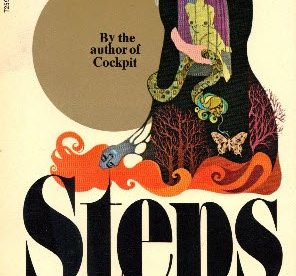The Surprising Way to Get Rejected

In 1968, novelist Jerzy Kosiński wrote his second book, Steps. It received a good amount of critical acclaim — it won the 1969 National Book Award for Fiction, perhaps the most prestigious awards given for such works. But as books go, if you haven’t heard about it, you’re not alone — Steps wasn’t a commercial success — and has, in many ways, been forgotten since.
Just ask Chuck Ross, another writer you probably never heard of.
Ross’s career is non-descript, but not due to lack of trying. In the 1970s, he wrote a mystery novel in his spare time and shopped the manuscript around. Publisher after publisher sent him the same reply: thanks, but no thanks. Most writers would have moved on, but Ross’s manuscript came with a trick of sorts. CNN explained:
[Ross] had put a little seal on the last few pages of the manuscript — the pages that were the payoff to his story. It was intended to be a clever enticement; when the editors at the publishing houses got to the end, they would remove the little seal to read the climax of the book.
But when every publisher sent the manuscript back to him, with letters telling him why they didn’t want his story, he noticed something:
The seals on the last few pages had not been broken. Not on any of the manuscripts.
Believing that publishers were judging a book by its cover, Ross tried a new experiment. In 1979, he typed up the first 21 pages of Kosiński’s Steps and, without putting the original author’s name on it (instead using the pseudonym Erik Demos) or putting a title on the piece. He sent it to more than a dozen publishers — including the book’s original publishing house. And again, he attracted nothing but rejection, despite the already-established quality of the manuscript. As Ross told the Museum of Hoaxes, “Evidently, Kosiński is not as good as Kosiński when Demos is the name on the envelope.”
Ross wasn’t done yet, though. A few years later, he re-keyed the script to Casablanca and sent it off to 217 movie studios, again with a false title and under the name of Erik Demos. (He also changed many character names to make the ruse less obvious.) Many rejected it outright — they didn’t accept unsolicited manuscripts — and some didn’t reply at all. Of the 64 who claimed to review the script, 33 correctly identified what they were reading. But some fell into the trap. Again, per the Museum of Hoaxes: “Thirty-eight agencies claimed to have read it, but rejected it. In other words, of those agencies that actually read the manuscript (or claimed to have), the majority did not recognize it as Casablanca, nor did they think the script was good enough to be worth representing.”
And the last three? They offered to represent Ross and push his story forward. Oops?
Ross declined to go further — he had already proved to himself that his rejection letters were not a completely accurate reflection of his talents. (And it’s not like he could have cashed in on his slightly modified version of Casablanca anyway.)
Bonus fact: The iconic line from Casablanca, “Play it again, Sam,” isn’t actually in the movie. Watch this first clip — Ilsa says “Play it once, Sam, for old times’ sake” and then “Play it, Sam. Play ‘As Time Goes By’,” but never says the word “again.” In a subsequent scene — watch it here — Rick says “you played it for her, you can play it for me,” and “if she can stand it, I can! Play it!” — not saying “again” nor “Sam.”
From the Archives: Fishing for Compliments: The book created by a phone book ad and an entrepreneur with a great angle.
